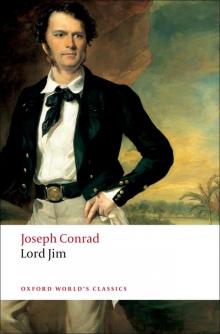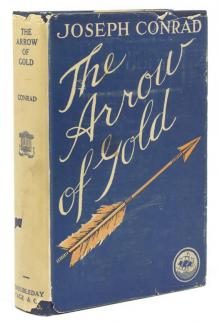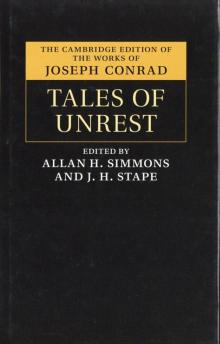- Home
- Joseph Conrad
The Secret Sharer and Other Stories Page 6
The Secret Sharer and Other Stories Read online
Page 6
And Captain MacWhirr wrote home from the coast of China twelve times every year, desiring quaintly to be “remembered to the children,” and subscribing himself “your loving husband,” as calmly as if the words so long used by so many men were, apart from their shape, worn-out things, and of a faded meaning.
The China seas north and south are narrow seas. They are seas full of everyday, eloquent facts, such as islands, sand banks, reefs, swift and changeable currents—tangled facts that nevertheless speak to a seaman in clear and definite language. Their speech appealed to Captain MacWhirr’s sense of realities so forcibly that he had given up his stateroom below and practically lived all his days on the bridge of his ship, often having his meals sent up, and sleeping at night in the chart room. And he indited there his home letters. Each of them, without exception, contained the phrase, “The weather has been very fine this trip,” or some other form of a statement to that effect. And this statement, too, in its wonderful persistence, was of the same perfect accuracy as all the others they contained.
Mr. Rout likewise wrote letters; only no one on board knew how chatty he could be pen in hand, because the chief engineer had enough imagination to keep his desk locked. His wife relished his style greatly. They were a childless couple, and Mrs. Rout, a big, high-bosomed, jolly woman of forty, shared with Mr. Rout’s toothless and venerable mother a little cottage near Teddington. She would run over her correspondence, at breakfast, with lively eyes, and scream out interesting passages in a joyous voice at the deaf old lady, prefacing each extract by the warning shout, “Solomon says!” She had the trick of firing off Solomon’s utterances also upon strangers, astonishing them easily by the unfamiliar text and the unexpectedly jocular vein of these quotations. On the day the new curate called for the first time at the cottage, she found occasion to remark, “As Solomon says: ‘the engineers that go down to the sea in ships behold the wonders of sailor nature’ ”; when a change in the visitor’s countenance made her stop and stare.
“Solomon. . . . Oh! . . . Mrs. Rout,” stuttered the young man, very red in the face, “I must say . . . I don’t. . . .”
“He’s my husband,” she announced in a great shout, throwing herself back in the chair. Perceiving the joke, she laughed immoderately with a handkerchief to her eyes, while he sat wearing a forced smile, and, from his inexperience of jolly women, fully persuaded that she must be deplorably insane. They were excellent friends afterwards; for, absolving her from irreverent intention, he came to think she was a very worthy person indeed; and he learned in time to receive without flinching other scraps of Solomon’s wisdom.
“For my part,” Solomon was reported by his wife to have said once, “give me the dullest ass for a skipper before a rogue. There is a way to take a fool; but a rogue is smart and slippery.” This was an airy generalization drawn from the particular case of Captain MacWhirr’s honesty, which, in itself, had the heavy obviousness of a lump of clay. On the other hand, Mr. Jukes, unable to generalize, unmarried, and unengaged, was in the habit of opening his heart after another fashion to an old chum and former shipmate, actually serving as second officer on board an Atlantic liner.
First of all he would insist upon the advantages of the Eastern trade, hinting at its superiority to the Western ocean service. He extolled the sky, the seas, the ships, and the easy life of the Far East. The Nan-Shan, he affirmed, was second to none as a sea boat.
“We have no brass-bound uniforms, but then we are like brothers here,” he wrote. “We all mess together and live like fighting cocks. . . . All the chaps of the black-squad are as decent as they make that kind, and old Sol, the Chief, is a dry stick. We are good friends. As to our old man, you could not find a quieter skipper. Sometimes you would think he hadn’t sense enough to see anything wrong. And yet it isn’t that. Can’t be. He has been in command for a good few years now. He doesn’t do anything actually foolish, and gets his ship along all right without worrying anybody. I believe he hasn’t brains enough to enjoy kicking up a row. I don’t take advantage of him. I would scorn it. Outside the routine of duty he doesn’t seem to understand more than half of what you tell him. We get a laugh out of this at times; but it is dull, too, to be with a man like this—in the long run. Old Sol says he hasn’t much conversation. Conversation! O Lord! He never talks. The other day I had been yarning under the bridge with one of the engineers, and he must have heard us. When I came up to take my watch, he steps out of the chart room and has a good look all round, peeps over at the sidelights, glances at the compass, squints upwards at the stars. That’s his regular performance. By and by he says: ‘Was that you talking just now in the port alleyway?’ ‘Yes, sir.’ ‘With the third engineer?’ ‘Yes, sir.’ He walks off to starboard, and sits under the dodger on a little campstool of his, and for half an hour perhaps he makes no sound, except that I heard him sneeze once. Then after a while I hear him getting up over there, and he strolls across to port, where I was. ‘I can’t understand what you can find to talk about,’ says he. ‘Two solid hours. I am not blaming you. I see people ashore at it all day long, and then in the evening they sit down and keep at it over the drinks. Must be saying the same things over and over again. I can’t understand.’
“Did you ever hear anything like that? And he was so patient about it. It made me quite sorry for him. But he is exasperating, too, sometimes. Of course one would not do anything to vex him even if it were worth while. But it isn’t. He’s so jolly innocent that if you were to put your thumb to your nose and wave your fingers at him he would only wonder gravely to himself what got into you. He told me once quite simply that he found it very difficult to make out what made people always act so queerly. He’s too dense to trouble about, and that’s the truth.”
Thus wrote Mr. Jukes to his chum in the Western ocean trade, out of the fullness of his heart and the liveliness of his fancy.
He had expressed his honest opinion. It was not worth while trying to impress a man of that sort. If the world had been full of such men, life would have probably appeared to Jukes an unentertaining and unprofitable business. He was not alone in his opinion. The sea itself, as if sharing Mr. Jukes’ good-natured forbearance, had never put itself out to startle the silent man, who seldom looked up, and wandered innocently over the waters with the only visible purpose of getting food, raiment, and house-room for three people ashore. Dirty weather he had known, of course. He had been made wet, uncomfortable, tired in the usual way, felt at the time and presently forgotten. So that upon the whole he had been justified in reporting fine weather at home. But he had never been given a glimpse of immeasurable strength and of immoderate wrath, the wrath that passes exhausted but never appeased—the wrath and fury of the passionate sea. He knew it existed, as we know that crime and abominations exist; he had heard of it as a peaceable citizen in a town that hears of battles, famines, and floods, and yet knows nothing of what these things mean—though, indeed, he may have been mixed up in a street row, have gone without his dinner once, or been soaked to the skin in a shower. Captain MacWhirr had sailed over the surface of the oceans as some men go skimming over the years of existence to sink gently into a placid grave, ignorant of life to the last, without ever having been made to see all it may contain of perfidy, of violence, and of terror. There are on sea and land such men thus fortunate—or thus disdained by destiny or by the sea.
II
Observing the steady fall of the barometer, Captain MacWhirr thought, “There’s some dirty weather knocking about.” This is precisely what he thought. He had had an experience of moderately dirty weather—the term dirty as applied to the weather implying only moderate discomfort to the seaman. Had he been informed by an indisputable authority that the end of the world was to be finally accomplished by a catastrophic disturbance of the atmosphere, he would have assimilated the information under the simple idea of dirty weather, and no other, because he had no experience of cataclysms, and belief does not necessarily imply comprehension. The wisdom of his coun
try had pronounced by means of an Act of Parliament that before he could be considered as fit to take charge of a ship he should be able to answer certain simple questions on the subject of circular storms such as hurricanes, cyclones, typhoons; and apparently he had answered them, since he was now in command of the Nan-Shan in the China seas during the season of typhoons. But if he had answered he remembered nothing of it. He was, however, conscious of being made uncomfortable by the clammy heat. He came out on the bridge, and found no relief to this oppression. The air seemed thick. He gasped like a fish, and began to believe himself greatly out of sorts.
The Nan-Shan was plowing a vanishing furrow upon the circle of the sea that had the surface and the shimmer of an undulating piece of gray silk. The sun, pale and without rays, poured down leaden heat in a strangely indecisive light, and the Chinamen were lying prostrate about the decks. Their bloodless, pinched, yellow faces were like the faces of bilious invalids. Captain MacWhirr noticed two of them especially, stretched out on their backs below the bridge. As soon as they had closed their eyes they seemed dead. Three others, however, were quarreling barbarously away forward; and one big fellow, half naked, with herculean shoulders, was hanging limply over a winch; another, sitting on the deck, his knees up and his head drooping sideways in a girlish attitude, was plaiting his pigtail with infinite languor depicted in his whole person and in the very movement of his fingers. The smoke struggled with difficulty out of the funnel, and instead of streaming away spread itself out like an infernal sort of cloud, smelling of sulphur and raining soot all over the decks.
“What the devil are you doing there, Mr. Jukes?” asked Captain MacWhirr.
This unusual form of address, though mumbled rather than spoken, caused the body of Mr. Jukes to start as though it had been prodded under the fifth rib. He had had a low bench brought on the bridge, and sitting on it, with a length of rope curled about his feet and a piece of canvas stretched over his knees, was pushing a sail-needle vigorously. He looked up, and his surprise gave to his eyes an expression of innocence and candor.
“I am only roping some of that new set of bags we made last trip for whipping up coals,” he remonstrated, gently. “We shall want them for the next coaling, sir.”
“What became of the others?”
“Why, worn out of course, sir.”
Captain MacWhirr, after glaring down irresolutely at his chief mate, disclosed the gloomy and cynical conviction that more than half of them had been lost overboard, “if only the truth was known,” and retired to the other end of the bridge. Jukes, exasperated by this unprovoked attack, broke the needle at the second stitch, and dropping his work got up and cursed the heat in a violent undertone.
The propeller thumped, the three Chinamen forward had given up squabbling very suddenly, and the one who had been plaiting his tail clasped his legs and stared dejectedly over his knees. The lurid sunshine cast faint and sickly shadows. The swell ran higher and swifter every moment, and the ship lurched heavily in the smooth, deep hollows of the sea.
“I wonder where that beastly swell comes from,” said Jukes aloud, recovering himself after a stagger.
“Northeast,” grunted the literal MacWhirr, from his side of the bridge. “There’s some dirty weather knocking about. Go and look at the glass.”
When Jukes came out of the chart room, the cast of his countenance had changed to thoughtfulness and concern. He caught hold of the bridge rail and stared ahead.
The temperature in the engine room had gone up to a hundred and seventeen degrees. Irritated voices were ascending through the skylight and through the fiddle of the stokehold in a harsh and resonant uproar, mingled with angry clangs and scrapes of metal, as if men with limbs of iron and throats of bronze had been quarreling down there. The second engineer was falling foul of the stokers for letting the steam go down. He was a man with arms like a blacksmith, and generally feared; but that afternoon the stokers were answering him back recklessly, and slammed the furnace doors with the fury of despair. Then the noise ceased suddenly, and the second engineer appeared, emerging out of the stokehold streaked with grime and soaking wet like a chimney sweep coming out of a well. As soon as his head was clear of the fiddle he began to scold Jukes for not trimming properly the stokehold ventilators; and in answer Jukes made with his hands deprecatory soothing signs meaning: “No wind—can’t be helped—you can see for yourself.” But the other wouldn’t hear reason. His teeth flashed angrily in his dirty face. He didn’t mind, he said, the trouble of punching their blanked heads down there, blank his soul, but did the condemned sailors think you could keep steam up in the God-forsaken boilers simply by knocking the blanked stokers about? No, by George! You had to get some draught, too—may he be everlastingly blanked for a swab-headed deck hand if you didn’t! And the chief, too, rampaging before the steam gauge and carrying on like a lunatic up and down the engine room ever since noon. What did Jukes think he was stuck up there for, if he couldn’t get one of his decayed, good-for-nothing deck-cripples to turn the ventilators to the wind?
The relations of the “engine room” and the “deck” of the Nan-Shan were, as is known, of a brotherly nature; therefore Jukes leaned over and begged the other in a restrained tone not to make a disgusting ass of himself; the skipper was on the other side of the bridge. But the second declared mutinously that he didn’t care a rap who was on the other side of the bridge, and Jukes, passing in a flash from lofty disapproval into a state of exaltation, invited him in unflattering terms to come up and twist the beastly things to please himself, and catch such wind as a donkey of his sort could find. The second rushed up to the fray. He flung himself at the port ventilator as though he meant to tear it out bodily and toss it overboard. All he did was to move the cowl round a few inches, with an enormous expenditure of force, and seemed spent in the effort. He leaned against the back of the wheelhouse, and Jukes walked up to him.
“Oh, Heavens!” ejaculated the engineer in a feeble voice. He lifted his eyes to the sky, and then let his glassy stare descend to meet the horizon that, tilting up to an angle of forty degrees, seemed to hang on a slant for a while and settled down slowly. “Heavens! Phew! What’s up, anyhow?”
Jukes, straddling his long legs like a pair of compasses, put on an air of superiority. “We’re going to catch it this time,” he said. “The barometer is tumbling down like anything, Harry. And you trying to kick up that silly row....”
The word “barometer” seemed to revive the second engineer’s mad animosity. Collecting afresh all his energies, he directed Jukes in a low and brutal tone to shove the unmentionable instrument down his gory throat. Who cared for his crimson barometer? It was the steam—the steam—that was going down; and what between the firemen going faint and the chief going silly, it was worse than a dog’s life for him; he didn’t care a tinker’s curse how soon the whole show was blown out of the water. He seemed on the point of having a cry, but after regaining his breath he muttered darkly, “I’ll faint them,” and dashed off. He stopped upon the fiddle long enough to shake his fist at the unnatural daylight, and dropped into the dark hole with a whoop.
When Jukes turned, his eyes fell upon the rounded back and the big red ears of Captain MacWhirr, who had come across. He did not look at his chief officer, but said at once, “That’s a very violent man, that second engineer. ”
“Jolly good second, anyhow,” grunted Jukes. “They can’t keep up steam,” he added, rapidly, and made a grab at the rail against the coming lurch.
Captain MacWhirr, unprepared, took a run and brought himself up with a jerk by an awning stanchion.
“A profane man,” he said, obstinately. “If this goes on, I’ll have to get rid of him the first chance.”
“It’s the heat,” said Jukes. “The weather’s awful. It would make a saint swear. Even up here I feel exactly as if I had my head tied up in a woolen blanket.”
Captain MacWhirr looked up. “D’ye mean to say, Mr. Jukes, you ever had your head tied up in a bla
nket? What was that for?”
“It’s a manner of speaking, sir,” said Jukes, stolidly.
“Some of you fellows do go on! What’s that about saints swearing? I wish you wouldn’t talk so wild. What sort of saint would that be that would swear? No more saint than yourself, I expect. And what’s a blanket got to do with it—or the weather either. . . . The heat does not make me swear—does it? It’s filthy bad temper. That’s what it is. And what’s the good of your talking like this?”
Thus Captain MacWhirr expostulated against the use of images in speech, and at the end electrified Jukes by a contemptuous snort, followed by words of passion and resentment: “Damme! I’ll fire him out of the ship if he don’t look out.”
And Jukes, incorrigible, thought: “Goodness me! Somebody’s put a new inside to my old man. Here’s temper, if you like. Of course it’s the weather; what else? It would make an angel quarrelsome—let alone a saint.”
All the Chinamen on deck appeared at their last gasp.
At its setting the sun had a diminished diameter and an expiring brown, rayless glow, as if millions of centuries elapsing since the morning had brought it near its end. A dense bank of cloud became visible to the northward; it had a sinister dark-olive tint, and lay low and motionless upon the sea, resembling a solid obstacle in the path of the ship. She went floundering towards it like an exhausted creature driven to its death. The coppery twilight retired slowly, and the darkness brought out overhead a swarm of unsteady, big stars, that, as if blown upon, flickered exceedingly and seemed to hang very near the earth. At eight o’clock Jukes went into the chart room to write up the ship’s log.
He copied neatly out of the rough-book the number of miles, the course of the ship, and in the column for “wind” scrawled the word “calm” from top to bottom of the eight hours since noon. He was exasperated by the continuous, monotonous rolling of the ship. The heavy inkstand would slide away in a manner that suggested perverse intelligence in dodging the pen. Having written in the large space under the head of “Remarks” “Heat very oppressive,” he stuck the end of the penholder in his teeth, pipe fashion, and mopped his face carefully.

 Heart of Darkness
Heart of Darkness Lord Jim
Lord Jim The Nigger of the Narcissus (Echo Library)
The Nigger of the Narcissus (Echo Library) Victory (Dover Thrift Editions)
Victory (Dover Thrift Editions) Secret Agent
Secret Agent Nostromo
Nostromo Chance: A Tale in Two Parts
Chance: A Tale in Two Parts Youth
Youth Almayer's Folly
Almayer's Folly The Heart of Darkness and the Secret Sharer
The Heart of Darkness and the Secret Sharer The Arrow of Gold: A Story Between Two Notes
The Arrow of Gold: A Story Between Two Notes The Rescue: A Romance of the Shallows
The Rescue: A Romance of the Shallows The Point Of Honor: A Military Tale
The Point Of Honor: A Military Tale Tales of Unrest
Tales of Unrest Under Western Eyes
Under Western Eyes Gaspar Ruiz
Gaspar Ruiz A Set of Six
A Set of Six Heart of Darkness and the Congo Diary (Penguin Classics)
Heart of Darkness and the Congo Diary (Penguin Classics) Heart of Darkness and Selected Short Fiction
Heart of Darkness and Selected Short Fiction Typhoon
Typhoon Youth, a Narrative
Youth, a Narrative Tomorrow
Tomorrow The Arrow of Gold
The Arrow of Gold The Shadow Line: A Confession
The Shadow Line: A Confession The Rescue
The Rescue Victory (Echo Library)
Victory (Echo Library) The Brute
The Brute Romance
Romance A Personal Record
A Personal Record Lord Jim: A Tale
Lord Jim: A Tale Heart of Darkness and Selected Short Fiction (Barnes & Noble Classics Series)
Heart of Darkness and Selected Short Fiction (Barnes & Noble Classics Series) Within the Tides
Within the Tides The Secret Sharer and Other Stories
The Secret Sharer and Other Stories Falk
Falk Heart of Darkness and The Secret Sharer
Heart of Darkness and The Secret Sharer Chance
Chance An Anarchist
An Anarchist The Secret Agent: A Simple Tale
The Secret Agent: A Simple Tale The Secret Agent
The Secret Agent Complete Works of Joseph Conrad (Illustrated)
Complete Works of Joseph Conrad (Illustrated) Heart of Darkness and the Congo Diary
Heart of Darkness and the Congo Diary Notes on Life & Letters
Notes on Life & Letters Typhoon (Single Story)
Typhoon (Single Story)